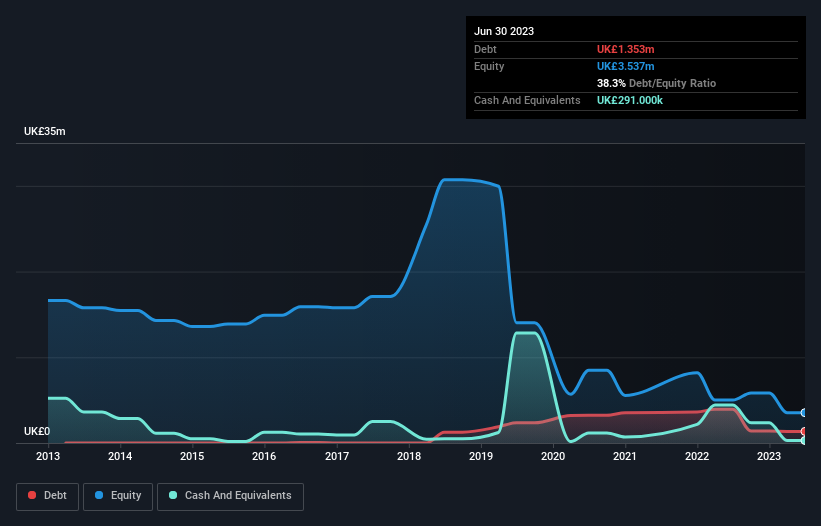- United Kingdom
- /
- Metals and Mining
- /
- AIM:ARCM
Would Arc Minerals (LON:ARCM) Be Better Off With Less Debt?
Some say volatility, rather than debt, is the best way to think about risk as an investor, but Warren Buffett famously said that 'Volatility is far from synonymous with risk.' So it seems the smart money knows that debt - which is usually involved in bankruptcies - is a very important factor, when you assess how risky a company is. We can see that Arc Minerals Limited (LON:ARCM) does use debt in its business. But should shareholders be worried about its use of debt?
When Is Debt A Problem?
Generally speaking, debt only becomes a real problem when a company can't easily pay it off, either by raising capital or with its own cash flow. In the worst case scenario, a company can go bankrupt if it cannot pay its creditors. While that is not too common, we often do see indebted companies permanently diluting shareholders because lenders force them to raise capital at a distressed price. Of course, debt can be an important tool in businesses, particularly capital heavy businesses. The first thing to do when considering how much debt a business uses is to look at its cash and debt together.
Check out our latest analysis for Arc Minerals
What Is Arc Minerals's Debt?
The image below, which you can click on for greater detail, shows that Arc Minerals had debt of UK£1.35m at the end of June 2023, a reduction from UK£3.94m over a year. However, because it has a cash reserve of UK£291.0k, its net debt is less, at about UK£1.06m.

How Healthy Is Arc Minerals' Balance Sheet?
We can see from the most recent balance sheet that Arc Minerals had liabilities of UK£2.93m falling due within a year, and liabilities of UK£106.0k due beyond that. On the other hand, it had cash of UK£291.0k and UK£1.11m worth of receivables due within a year. So its liabilities outweigh the sum of its cash and (near-term) receivables by UK£1.64m.
Since publicly traded Arc Minerals shares are worth a total of UK£32.5m, it seems unlikely that this level of liabilities would be a major threat. However, we do think it is worth keeping an eye on its balance sheet strength, as it may change over time. There's no doubt that we learn most about debt from the balance sheet. But you can't view debt in total isolation; since Arc Minerals will need earnings to service that debt. So when considering debt, it's definitely worth looking at the earnings trend. Click here for an interactive snapshot.
Since Arc Minerals has no significant operating revenue, shareholders probably hope it will develop a valuable new mine before too long.
Caveat Emptor
Importantly, Arc Minerals had an earnings before interest and tax (EBIT) loss over the last year. Its EBIT loss was a whopping UK£3.5m. Considering that alongside the liabilities mentioned above does not give us much confidence that company should be using so much debt. Quite frankly we think the balance sheet is far from match-fit, although it could be improved with time. However, it doesn't help that it burned through UK£2.9m of cash over the last year. So suffice it to say we consider the stock very risky. The balance sheet is clearly the area to focus on when you are analysing debt. But ultimately, every company can contain risks that exist outside of the balance sheet. These risks can be hard to spot. Every company has them, and we've spotted 4 warning signs for Arc Minerals (of which 2 don't sit too well with us!) you should know about.
If you're interested in investing in businesses that can grow profits without the burden of debt, then check out this free list of growing businesses that have net cash on the balance sheet.
New: Manage All Your Stock Portfolios in One Place
We've created the ultimate portfolio companion for stock investors, and it's free.
• Connect an unlimited number of Portfolios and see your total in one currency
• Be alerted to new Warning Signs or Risks via email or mobile
• Track the Fair Value of your stocks
Have feedback on this article? Concerned about the content? Get in touch with us directly. Alternatively, email editorial-team (at) simplywallst.com.
This article by Simply Wall St is general in nature. We provide commentary based on historical data and analyst forecasts only using an unbiased methodology and our articles are not intended to be financial advice. It does not constitute a recommendation to buy or sell any stock, and does not take account of your objectives, or your financial situation. We aim to bring you long-term focused analysis driven by fundamental data. Note that our analysis may not factor in the latest price-sensitive company announcements or qualitative material. Simply Wall St has no position in any stocks mentioned.
About AIM:ARCM
Arc Minerals
Engages in the acquisition, exploration, and development of mineral properties in Africa.
Adequate balance sheet with slight risk.
Market Insights
Weekly Picks


Crazy Undervalued 42 Baggers Silver Play (Active & Running Mine)


Fiducian: Compliance Clouds or Value Opportunity?

Willamette Valley Vineyards (WVVI): Not-So-Great Value
Recently Updated Narratives

Watch Pulse Seismic Outperform with 13.6% Revenue Growth in the Coming Years

Significantly undervalued gold explorer in Timmins, finally getting traction

Moderation and Stabilisation: HOLD: Fair Price based on a 4-year Cycle is $12.08
Popular Narratives


MicroVision will explode future revenue by 380.37% with a vision towards success


NVDA: Expanding AI Demand Will Drive Major Data Center Investments Through 2026





